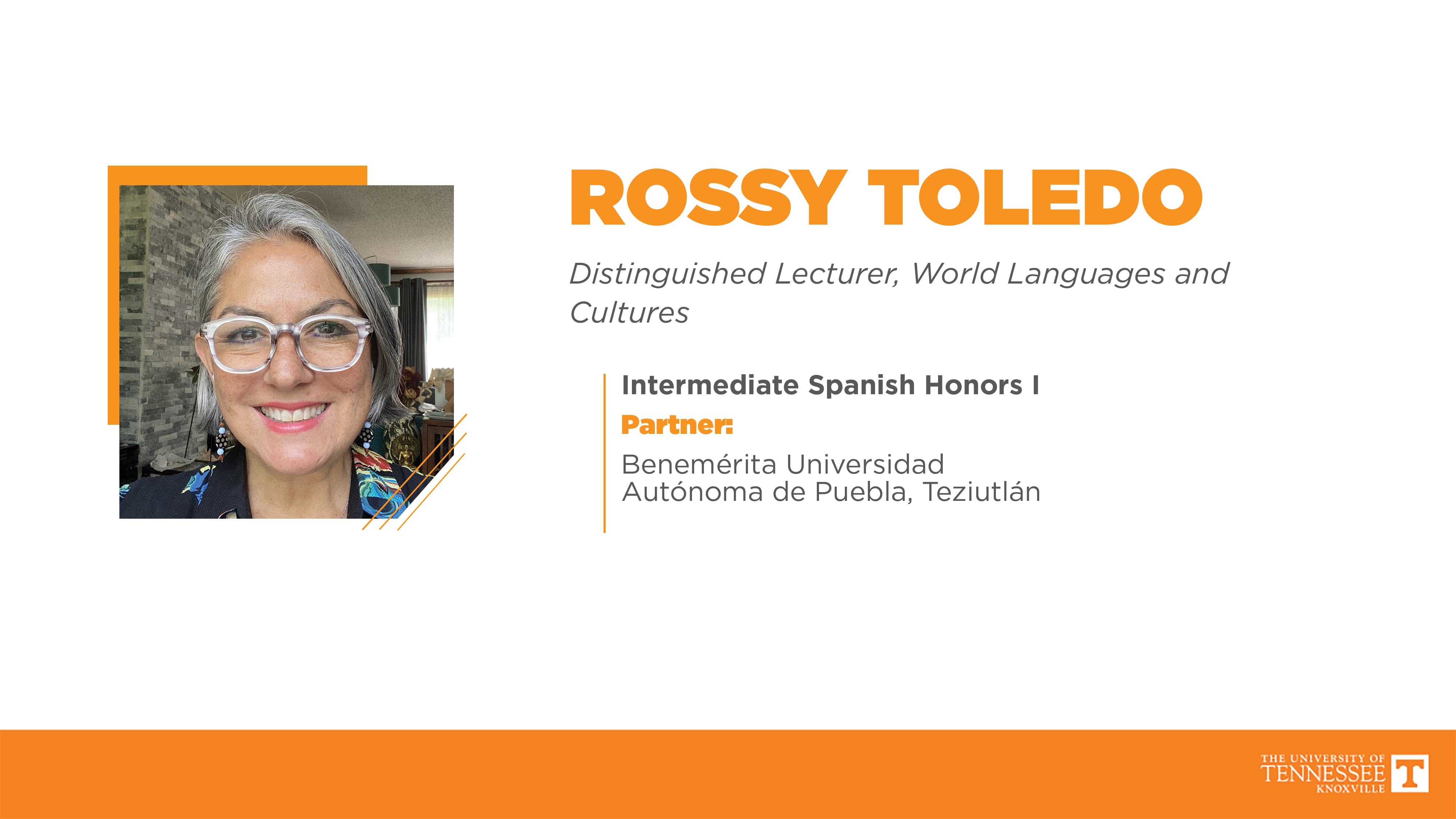Rossy Toledo, MFA was born and raised in Mexico City. She graduated from the University of Texas at Austin in 1994 with a B.S. in Communications. She worked in advertising and media for 13 years, including radio and TV advertising production, print design, and publishing. She started teaching Spanish for the MFLL at the University of Tennessee after graduating with an M.A. in Spanish in 2002. Her passion for marketing, advertising, and the media world continues. For this reason, she designed a specialized Intermediate Spanish Course for Communications Majors: Journalism, Advertising, and Public Relations, where her students get involved in service-learning projects. Toledo earned a Teaching Innovation award in 2017 for the project Recording the Lives of East Tennessee Immigrants, where Spanish Honor Students work with community members to record their life stories through StoryCorps.
Since 2010, Toledo pioneered the world of Virtual Teaching for the University of Tennessee designing and implementing Intermediate Spanish Online. She is currently a Technology Enhanced Teaching Faculty Fellow and thus helps advance the University’s mission in online teaching.
Toledo finished an MFA in creative writing from NYU (May 2012) with her creative dissertation Pregonero Despertar de published by Abismos in April 2013. Her second poetry collection, Azules Sueños Naranja was published in August 2013 by miCielo. In May 2015 she coedited an Anthology of Bilingual-Bicultural texts Nos pasamos de la Raya/We crossed the line. Toledo is currently working on her third poetry collection Vacíos/Emptiness, and on the Second Volume of Nos pasamos de la raya/We Crossed the Line. Her research interests include Gender Studies, Hispanic Cinema, Cultural Competency, and Service and Experiential Learning.
Q: How did you get started in international work?
A: Apart from the fact that I am an immigrant, international work is tightly related to my area of study and research (Spanish Language and Hispanic Culture). We always discuss artifacts, practices, and customs in other countries, and I’ve always encouraged my students to study abroad. However, this option is not available to everyone due to the lack of time, funds, or family commitments.
Q: What made you want to get involved in the intercultural aspect of your field?
A: It is just impossible no to get involved in intercultural work in my field.
Q: How has global collaboration made an impact on your professional activities?
A: Global collaboration has enhanced the way I teach. Through global collaboration I help my students go abroad without leaving the classroom. It is like bring the world to them.
Q: There has been a lot of change with internationally engaged research, teaching and service in this past year, how have you been adapting your professional work?
A: As a language teacher participating in the COIL (Collaborative International Online Learning) workshop and learning the COIL methodology has opened new opportunities to my professional work and to my students’ learning. I feel more prepared to bring a level of international engagement not previously available to them in my classes. In our world today, it is imperative that we offer this kind of opportunity to every single student in Higher Education.
Q: What are some of your current professional projects?
A: I like to engage my students in experiential/service learning. In the past, my Honors Students interviewed Hispanic Community members and recorded these interviews in Story Corps, thus offering relevance to their personal narratives, stories that otherwise go unnoticed. For my students, the experience of interviewing someone that leads a life so different to their own, and that lives a happy life—even with the struggle of immigration, lower income, or other hardships—opens new perspectives for them. Another example of experiential learning is having me Spanish for the Communications students do and promotional campaign for a community partner. In the past, we have collaborated with the Department of Energy, with the Cancer Support Community of East Tennessee and right now we are working with WonderWorks in Sevierville, TN. These projects bind their learning to real life experience, making what they are learning more relevant to their professional life.
Q: Do you feel global engagement needs to be valued part of the university culture and why?
A: Yes, global engagement can be sought and achieved in every single study area, from economics, to advertising, ecology, biology, and music. Professors and their students can and should engage with learners around the world and learn from each other. Their world view will be expanded, and their local and national perspective will be informed by this new world viewpoint.
